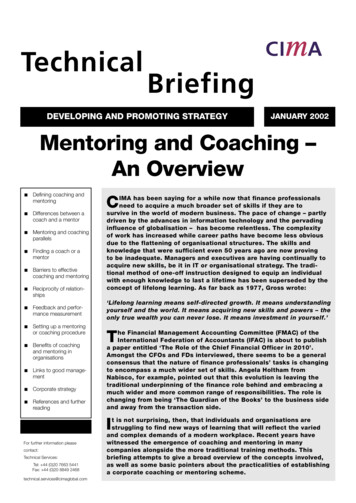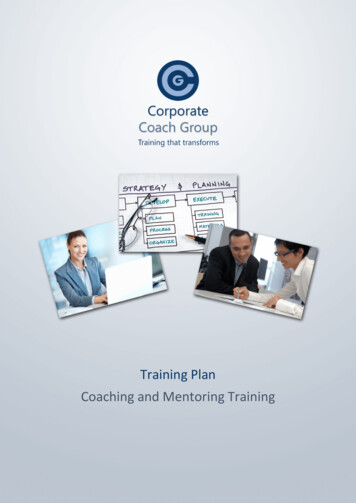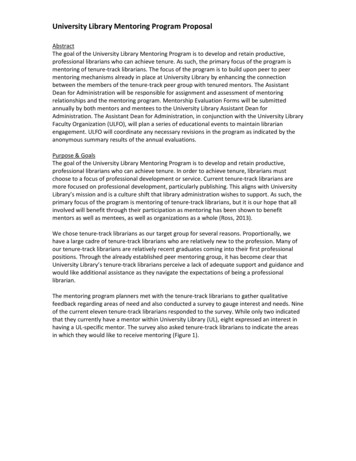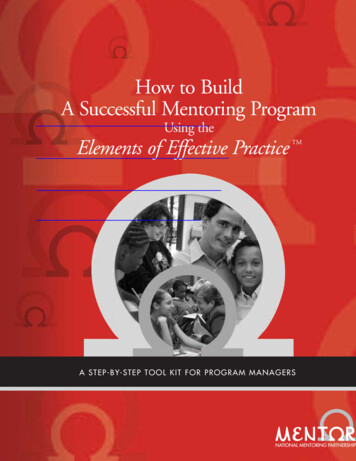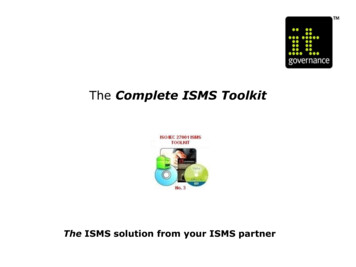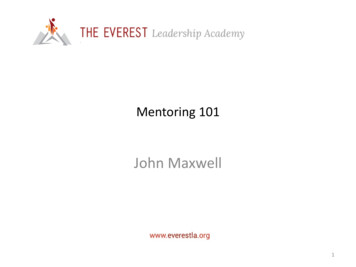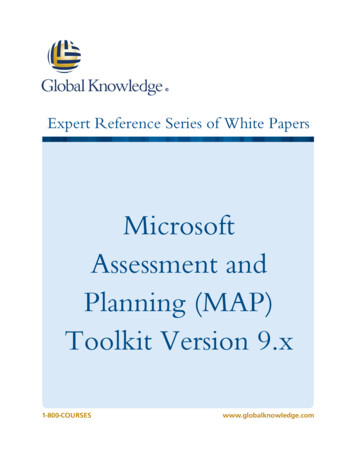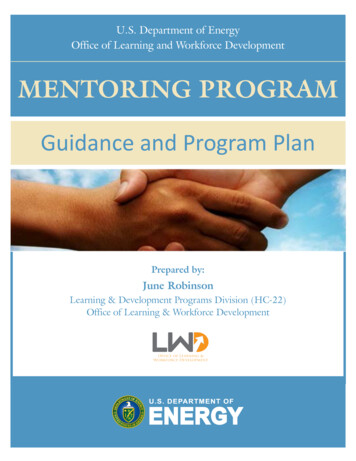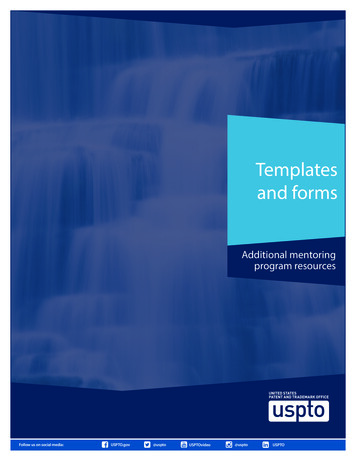
Transcription
Templatesand formsAdditional mentoringprogram resourcesFollow us on social media:USPTO.gov@usptoUSPTOvideo@usptoUSPTO
Templates and samplesIn this section, you will find the materials your mentoring program will need:Mentee Application . . . . . . . . . . . . . . . . . . . . . . . . . . . . . . . . . . . . . . . . . . . . . . . . . . . . . . . . . . . . . . . . . . . . . . . . . . . . . . 3Mentor Application . . . . . . . . . . . . . . . . . . . . . . . . . . . . . . . . . . . . . . . . . . . . . . . . . . . . . . . . . . . . . . . . . . . . . . . . . . . . . . 5Confidentiality Agreement . . . . . . . . . . . . . . . . . . . . . . . . . . . . . . . . . . . . . . . . . . . . . . . . . . . . . . . . . . . . . . . . . . . . . . . . 7Mentoring Agreement . . . . . . . . . . . . . . . . . . . . . . . . . . . . . . . . . . . . . . . . . . . . . . . . . . . . . . . . . . . . . . . . . . . . . . . . . . . . 8Mentee Action Plan . . . . . . . . . . . . . . . . . . . . . . . . . . . . . . . . . . . . . . . . . . . . . . . . . . . . . . . . . . . . . . . . . . . . . . . . . . . . . . 9Mentoring Log . . . . . . . . . . . . . . . . . . . . . . . . . . . . . . . . . . . . . . . . . . . . . . . . . . . . . . . . . . . . . . . . . . . . . . . . . . . . . . . . . 10Mentoring Program Mid-Point Review — Mentor Form . . . . . . . . . . . . . . . . . . . . . . . . . . . . . . . . . . . . . . . . . . . . . . . 11Mentoring Program Mid-Point Review — Mentee Form . . . . . . . . . . . . . . . . . . . . . . . . . . . . . . . . . . . . . . . . . . . . . . 13Mentoring Program Final Review — Mentor Form . . . . . . . . . . . . . . . . . . . . . . . . . . . . . . . . . . . . . . . . . . . . . . . . . . . 15Mentoring Program Final Review — Mentee Form . . . . . . . . . . . . . . . . . . . . . . . . . . . . . . . . . . . . . . . . . . . . . . . . . . . 17Mentor benefits . . . . . . . . . . . . . . . . . . . . . . . . . . . . . . . . . . . . . . . . . . . . . . . . . . . . . . . . . . . . . . . . . . . . . . . . . . . . . . . . . 19Mentor roles and responsibilities . . . . . . . . . . . . . . . . . . . . . . . . . . . . . . . . . . . . . . . . . . . . . . . . . . . . . . . . . . . . . . . . . . 20Ideas to assist your mentee . . . . . . . . . . . . . . . . . . . . . . . . . . . . . . . . . . . . . . . . . . . . . . . . . . . . . . . . . . . . . . . . . . . . . . . . 21Effective questioning tips for mentors . . . . . . . . . . . . . . . . . . . . . . . . . . . . . . . . . . . . . . . . . . . . . . . . . . . . . . . . . . . . . . 22Giving feedback — checklist for mentors . . . . . . . . . . . . . . . . . . . . . . . . . . . . . . . . . . . . . . . . . . . . . . . . . . . . . . . . . . . 24Tips for being a good listener . . . . . . . . . . . . . . . . . . . . . . . . . . . . . . . . . . . . . . . . . . . . . . . . . . . . . . . . . . . . . . . . . . . . . 25Mentee benefits . . . . . . . . . . . . . . . . . . . . . . . . . . . . . . . . . . . . . . . . . . . . . . . . . . . . . . . . . . . . . . . . . . . . . . . . . . . . . . . . . 26Mentee roles and responsibilities . . . . . . . . . . . . . . . . . . . . . . . . . . . . . . . . . . . . . . . . . . . . . . . . . . . . . . . . . . . . . . . . . . 27Receiving feedback—checklist for mentees . . . . . . . . . . . . . . . . . . . . . . . . . . . . . . . . . . . . . . . . . . . . . . . . . . . . . . . . . 282
Mentee ApplicationMentoring is a special partnership between two people based on commitment to the mentoring process, common goals/expectations of the partnership, and mutual trust and respect.Mentoring is a “get and give” experience with the goal of providing a rich and rewarding experience for bothpartners. We ask you to share your information so the program manager can match you in a mentoring relationship. Both you and your recommended mentor will have the opportunity to agree to the pairing before you areassigned to work together.Please submit your application to [insert program manager name and contact info] no later than [insert timeand date].Name/title/grade:Work unit:Work phone number:Work email address:Please respond to the information requested below.1. List the series of positions and grades you have held:2. Why do you want to work with a mentor?3
3. Describe your strongest competencies (i.e., knowledge, skills, and abilities):4. Describe the competencies you would like to strengthen and/or leverage through working with a mentor:5. What are your interests or hobbies outside of work?6. Do you have someone in mind whom you would like to suggest as your mentor? If yes, list his or hername (we suggest selecting someone two grade levels above your current grade/organization):The program manager will confirm your requested mentor as a suitable match, his or her availability andinterest in participating in the mentoring program, and OHR management approval of the pairing. However, please note that there are no guarantees you will be paired with this individual.4
Mentor ApplicationMentoring is a special partnership between two people based on commitment to the mentoring process, common goals/expectations of the partnership, and mutual trust and respect.Mentoring is a “get and give” experience with the goal of providing a rich and rewarding experience for bothpartners. We ask you to share your information so the program manager can match you in a mentoring relationship. Both you and your recommended mentee will have the opportunity to agree to the pairing before you areassigned to work together.Please submit your application to [insert program manager name and contact info] no later than [insert timeand date].Name/title/grade:Organization/division:Work phone number:Work email address:# of mentees you would like to mentor:Please respond to the information requested below.1. Why do you want to be a mentor?2. List the series of positions and grades you have held:5
3. Describe what you consider to be your strongest general competencies (i.e., knowledge, skills,and abilities):4. Describe what you consider to be your strongest technical competencies:5. What do you think a mentee can learn from you?6. What are your interests or hobbies outside of work?6
Confidentiality AgreementTrust must be a verb before it is a noun. You must trust and be trustworthy to be trusted. It is one of the most,if not the most, important factors in the partnership.Mentoring pairs will share information about one another throughout the association. Partners must be veryclear on the limits they want to place on the information shared. Establishing clear boundaries is a big step toward building trust.Here are a couple of statements to start your agreement. You may accept these as they are, build upon them, orestablish a completely new agreement. The important thing is that both partners concur with the ConfidentialityAgreement.1. What we discuss will stay between the two of us. [use the space below to add to this]2. What we discuss will stay between the two of us, unless we give each other permission or ask that theinformation be shared with others. [use the space below to add to this]3. Add other additional conditions you both mutually agree to.Mentor signature dateMentee signature date7
Mentoring AgreementMentoring is a “get and give” experience with the goal of providing a rich and rewarding experience for bothpartners. Both partners must be respectful of each other’s time and commitments. We have created the followingform to assist you in developing a schedule for your meetings. Please print information and sign below. Eachpartner is to keep a copy, and one is to be turned in to the program manager.Mentor:Mentee:Meeting time (i.e. 10 a.m., 2:30 p.m., etc):Preferred meeting day:Frequency of meetings (i.e., once a week, every other week):We will generally meet for minutes.The best way to contact , the mentor,is by orThe best way to contact , the mentee,is by orIf unforeseen events arise and meeting time/day must be changed, we will give our mentoring partner at leasthour(s) notice if possible.Mentor signature dateMentee signature date8
Mentee Action Plan T: Time-basedR: Results-orientedA: AchievableM: MeasurableS: SpecificWith your mentor, set goals that are focused, realistic, and tied to your competency goals. Effective goals should be SMART: Beginning date andending dateMy co-workers andsupervisor will see thefollowing I know I have achievedmy goal when Focus on competencies important to your organization. Build on your strengths as well as your weaknesses. Look for opportunities to learn bydoing as well as observing and listening.Learning activity: Ehataction will I take todevelop this?Mentoring goal #1:Competency: Whatspecific skill do I wantto develop?9
TimeAttended orientationAction plan stepSet-up contract 6/24/09How and when completedMentoring LogDate11 a.m. – 1 p.m. TeamworkCompetency discussed6/24/1910
Mentoring Program Mid-Point Review — Mentor FormMentee name: Mentor name: Date:1. How has your overall experience with the mentoring program been so far?2. Do you feel the resources provided by the mentoring program manager adequately prepared you for yourrole as a mentor?3. Have you and your mentee been able to build a comfortable working relationship?11
4. Do you think reviewing your mentee’s application was helpful in learning how you two could worktogether? Why or why not?5. Do you think the Mentoring Log and Action Plan were helpful in keeping your meetings on track?Why or why not?6. Please share additional comments here:12
Mentoring Program Mid-Point Review — Mentee FormMentee name: Mentor Name: Date:1. How has your overall experience with the mentoring program been so far?2. Do you feel the resources provided by the mentoring program manager adequately prepared you for yourrole as a mentee?3. Have you and your mentor been able to build a comfortable working relationship?13
4. Are you able to learn from your mentor’s experience and background?5. Do you think reviewing your individual development plan with your mentor will help you achieve yourgoals? Why or why not?6. Please share additional comments here:14
Mentoring Program Final Review — Mentor FormMentee name: Mentor name: Date:1. Briefly give an overall description of your experience with the mentoring program.2. Do you think this program helped your mentee develop the skills and knowledge needed to take on largerroles and more challenges? Why or why not?3. Which part of the mentoring experience do you feel was the most useful in helping the mentee reach thestated goals? Was there an element that you felt was not useful?15
4. Would you recommend this experience as a mentor to a colleague? Why or why not?5. Are you interested in serving as a mentor again? Why or why not?6. Please share additional comments here:16
Mentoring Program Final Review — Mentee FormMentee Name: Mentor Name: Date:1. How has your overall experience with the mentoring program been so far?2. Do you feel the resources provided by the mentoring program manager adequately prepared you for yourrole as a mentee?3. Have you and your mentor been able to build a comfortable working relationship?17
4. Are you able to learn from your mentor’s experience and background?5. Do you think reviewing your Individual Development Plan with your mentor will help you achieve yourgoals? Why or why not?6. Please share additional comments here:18
Mentor benefitsMentoring is a valuable tool for developing our most important asset, our people. A successful mentoring process depends on the partners sharing common goals and expectations, having a commitment to the mentoringpractice, and giving and receiving trust and respect.Both the mentor and the mentee give and grow in the mentoring process. You, the mentor, have the opportunityto review your accomplishments and challenges as a reminder of lessons learned. In sharing your expertise, youare leaving a legacy and guiding another’s career path. This also gives you an opportunity to review and re-energize your personal career goals.You, the mentor, will get many benefits from this experience. Here are just a few additional benefits you mightconsider: Personal satisfaction in helping someone grow professionally Learning from the mentee Building new relationships Developing your skill as a “teacher” — helping someone clarify his or her career goals Developing your skill as a “guide” — helping someone navigate the waters of the organization Developing your skill as an “advisor” — helping someone find his or her strengths and weaknessesAs you reflect on being a mentor, think about who you would like as a mentee and what you would like to impartto him or her. This is, after all, going to be a partnership. Do you want someone who seems to be following your same career path? Do you want someone who has skills in which you have strengths? Do you want someone who has different or similar skills compared to you? Do you want someone who has interest in skills and knowledge similar to you, but does not possess thosecompetencies now? Do you want someone who is motivated by upward mobility?Use the above questions to help you respond to the questions on the Mentor Application.19
Mentor roles and responsibilitiesDevelopment of your mentee depends on exploring career aspirations, strengths and weaknesses; collaboratingon means to “get there;” implementing strategies; and evaluating along the way. You, as the mentor, provide the“light” for the mentee to follow. Sharing your wisdom and past experiences is what the mentee looks for from you.Here are a few roles and responsibilities to help you in the process: Support the mentee’s development of professional and interpersonal competencies through strategic questioning, goal setting, and planning. Create a supportive and trusting environment. Agree to, and schedule, uninterrupted time with your mentee. Stay accessible, committed, and engaged during the length of the program. Actively listen and question. Give feedback to the mentee on his/her goals, situations, plans, and ideas. Encourage your mentee by giving him or her genuine, positive reinforcement. Serve as a positive role model. Provide frank (and kind) corrective feedback if necessary. Openly and honestly share “lessons learned” from your own experience. Keep discussions on track. Respect your mentee’s time and resources. Participate in the scheduled events for the program. Seek assistance if questions arise that you cannot answer.20
Ideas to assist your mentee Shadowing events: “take your mentee to work.” Include him or her in any meetings when possible. Lookfor opportunities to include your partner in what you do. Your mentee will be able to observe you andhow you demonstrate your strong competencies. Work sharing: look for or design learning assignments in which your mentee can assist you with projectsto better understand your contribution to the organization. Hands-on training: find opportunities to share specific knowledge and introduce your mentee to newwork within the organization. Introducing: look for opportunities to introduce your mentee to key players or to others to broaden his orher prospective on the organization. Listen more than talk: review the effective questioning tips (page 22) for ideas on progressing and theactive listening tips (page 25) to find out what will work best with your mentee.21
Effective questioning tips for mentorsAs a mentor, it can be very easy to want to just jump in and solve your mentee’s problems for him/her. However,your role is to help the mentee think for him/herself, and to do so, this involves you asking thought-provokingquestions. Help your partner self-discover. Questions should usually be open-ended questions that cannot beanswered with a one-word answer.We want you to be a questioning coach. Use questions to help your mentee reflect on his or her experiences andlearn from yours. Being a questioning coach gives you, the mentor, an opportunity to: Uncover additional facts and information about your mentee Confirm your mentee’s goals, aspirations, and needs Explore strong feelings about situations Define problems and possible solutions Discover your mentee’s commitment to his or her growthExploratory questions — to assess the real issues and gain greater understanding: What are the most interesting aspects of your job? Why did you pick this to concentrate on? What do you want to gain? What do you want to be known for? What do you understand the issue to be? What tells you that your assessment is correct? What are other people’s perceptions of this issue? What assumptions are you making here? What other ideas do you have? How long has this been an issue? What did you learn from past experiences that you didn’t expect to learn? What are the reasons behind an issue? Have you tried to resolve this issue before? Why or why not? If yes, what was the result? What choices do you have? What progress have you made? What other ideas do you have? How are you using the things/ideas we’ve spoken about? What results are you looking for?22
Empowering questions — to assist the mentee to think for him/herself: What are the skills you want to develop? What strategies come to mind when looking at a situation? What do you see as possible solutions here? What outcomes are you after here? Are these outcomes reasonable given the circumstances? What resources are available to help you move forward? What key players do you need help from? What forces may help and/or hinder you? What other information do you need to arrive at a solution? What are the pros and cons of each solution? What is the first step you need to take to achieve your preferred outcome? What alternative strategies should you develop? How will you know you have mastered or successfully enhanced a competency? How will you apply your new skill?Ask more questions to really understand the responses you’ve been given. Rephrase the answer to ensure youhave heard the reply correctly.Most importantly—ask more questions and give fewer answers. Remember, he who speaks the most, learns themost!23
Giving feedback — checklist for mentorsThink of feedback as a teaching/counseling opportunity. Exhibit positive or neutral body language.Do use: Good eye contact — no scary stares Interested/neutral facial expression Nodding of head to show understanding or agreement Calm tone of voice Even voice volume Sitting slightly forward Relaxed arm and hand placementDo not use: Reduced eye contact, scowling, or narrowing of eyes Tense or aggressive posture Rocking, pen bouncing, hand wringing, or your specific version of nervousness/defensiveness Hands on hips or tightly clenched Arms tightly crossed across chest A blank expressionUse “I” statements. Give examples from your experience. Don’t say, “but” or “however.”Avoid statements that describe someone instead of his or her actions. Ensure feedback is specific.Give the other person an opportunity to ask questions or share his or her viewpoint.Listen carefully not only to the words but also to the feelings and body language of the speaker. Don’t becomedefensive.Don’t interrupt when the other person is responding.Allow time and privacy for feedback — avoid/minimize distractions, set aside an uninterrupted time for yourfeedback session.Help your mentee plan for next steps. Ask questions such as: What is a step you can do to reach your desired outcome? What are some ways you can think of to resolve this challenge? What resources are available to you? What can I do to help you?24
Tips for being a good listenerBe an “active” listener. That means doing the following: Give the employee your undivided attention. Stay off your phone and computer, and avoid disruptions. Hear the person out. Avoid interrupting. Be aware of your non-verbal cues such as nodding, smiling, and maintaining eye contact. To ensure that you heard the person correctly:––Paraphrase–– “As I understand ”–– “So, you’re saying that ” “Let me see if I got that ”––Summarize–– “So, your three concerns are ” “There seem to be a few issues ” “So, our main goals this timeare ”25
Mentee benefitsMentoring is a special partnership between two people based on commitment to the mentoring process, common goals and expectations, focus, and mutual trust and respect.Both the mentor and the mentee give and grow in the mentoring process. You, the mentee, can learn valuableknowledge from the mentor’s expertise and past mistakes. You can increase your competencies in specific areas.You can establish valuable connections with more senior and experienced employees.You, the mentee, will get many benefits from this experience. Here are just a few additional benefits you mightconsider: Having a caring ear to hear your triumphs as well as your frustrations Developing your skill as a “planner” — getting a sharper focus on what’s needed to grow professionally Developing your skill as a “learner” — finding new ways to acquire new skills Developing your skill as a “communicator” — improving your ability to express your expectations, goals,and concerns Learning what it is like to be in a higher-level position Having an advocate within the organization Receiving knowledge about the “ins and outs” of the organization Receiving honest feedbackAs you reflect on being mentored, think about who you would like as a mentor and what you would like to receive from him or her. This is, after all, going to be a partnership. Do you want someone who has gone on the same career path you would like to follow? Do you want someone who has modeled the competencies you would like to strengthen? Do you want someone who has skills you currently don’t have but wish to acquire? Do you want someone who will be a good sounding board for your goals?Use the above questions to help you respond to questions on the Mentee Application.26
Mentee roles and responsibilitiesYour development depends on exploring career aspirations, strengths and weaknesses; collaborating on means to“get there;” implementing strategies; and evaluating along the way. Your mentor will provide the “light” for youto follow. Learning from the wisdom and past experiences of your mentor will serve you well and produce greatbenefits. Here are a few roles and responsibilities to help you in the process: Commit to your development. Assume responsibility for acquiring or improving skills and knowledge. Discuss your Individual Development Plan with your mentor. Be open and honest on your goals, expectations, challenges and concerns. Actively listen and question. Build a supportive and trusting environment. Seek advice, opinion, feedback, and direction from your mentor. Be open to constructive criticism/feedback, and ask for it. Come to your meetings prepared with a clear idea of what topics or issues you want to address. Respect your mentor’s time and resources. Apply what you learn from your meetings when back on the job. Keep your supervisor informed of the process and your progress. Give feedback to your mentor on what is working or not working in the mentoring relationship. Participate in the scheduled events for the program.27
Receiving feedback—checklist for menteesThink of feedback as a learning opportunity. Exhibit positive or neutral body language.Do use: Good eye contact — no scary stares Interested/neutral facial expression Nodding of head to show understanding or agreement Calm tone of voice Even voice volume Sitting slightly forward Relaxed arm and hand placementDo not use: Reduced eye contact, scowling, or narrowing of eyes Tense or aggressive posture Rocking, pen bouncing, hand wringing, or your specific version of nervousness/defensiveness Hands on hips or tightly clenched Arms tightly crossed across chest A blank expressionDon’t interrupt when the other person is explaining.If you need more information, ask for clarification or specific examples.Paraphrase and repeat back to make sure you understood what was said. Keep doing this until you are clear onthe feedback. Say things like: What I understood you just told me was . When I you think I . What I hear you say is if I I will .Provide relevant background information and explanations, not excuses. In your last meeting with your mentor,you may not have given enough background, and there may have been a misunderstanding — elaborate if necessary.Listen carefully, and don’t become defensive. Do not “think ahead,” preparing a rebuttal to a comment. You maymiss a very important piece of information.Compare this feedback with other feedback you’ve received.Discuss strategies and next steps. Provide possible solutions — you are the captain of your ship. Seek follow-up toyour feedback session, and share your progress with your mentor.28
3 Mentee Application Mentoring is a special partnership between two people based on commitment to the mentoring process, com-mon goals/expect
